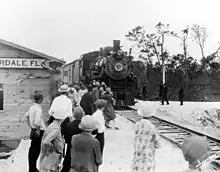Fort Lauderdale station
Fort Lauderdale station is a train station in Fort Lauderdale, Florida. It is served by Tri-Rail and Amtrak. The station is located on Southwest 21st Terrace, just south of West Broward Boulevard.
Fort Lauderdale, FL | ||||||||||||||||||||||||||||||||
|---|---|---|---|---|---|---|---|---|---|---|---|---|---|---|---|---|---|---|---|---|---|---|---|---|---|---|---|---|---|---|---|---|
 Northwest view of historic former Seaboard Air Line Railway (now Amtrak) station | ||||||||||||||||||||||||||||||||
| General information | ||||||||||||||||||||||||||||||||
| Location | 200 Southwest 21st Terrace Fort Lauderdale, Florida United States | |||||||||||||||||||||||||||||||
| Coordinates | 26°7′10.09″N 80°10′11.54″W | |||||||||||||||||||||||||||||||
| Owned by | Florida Department of Transportation | |||||||||||||||||||||||||||||||
| Line(s) | South Florida Rail Corridor | |||||||||||||||||||||||||||||||
| Platforms | 2 side platforms | |||||||||||||||||||||||||||||||
| Tracks | 2 | |||||||||||||||||||||||||||||||
| Train operators | Amtrak, Tri-Rail | |||||||||||||||||||||||||||||||
| Connections | ||||||||||||||||||||||||||||||||
| Construction | ||||||||||||||||||||||||||||||||
| Parking | Yes | |||||||||||||||||||||||||||||||
| Bicycle facilities | Racks | |||||||||||||||||||||||||||||||
| Accessible | Yes | |||||||||||||||||||||||||||||||
| Other information | ||||||||||||||||||||||||||||||||
| Station code | Amtrak: FTL | |||||||||||||||||||||||||||||||
| Fare zone | 4 (Tri-Rail) | |||||||||||||||||||||||||||||||
| History | ||||||||||||||||||||||||||||||||
| Opened | 1927 | |||||||||||||||||||||||||||||||
| Rebuilt | 1986 | |||||||||||||||||||||||||||||||
| Passengers | ||||||||||||||||||||||||||||||||
| FY 2022 | 31,194[1] (Amtrak) | |||||||||||||||||||||||||||||||
| Services | ||||||||||||||||||||||||||||||||
| ||||||||||||||||||||||||||||||||
| ||||||||||||||||||||||||||||||||
| ||||||||||||||||||||||||||||||||
History

The original station, which is used by Amtrak, is a former Seaboard Air Line Railway depot built in 1927. Designed in the prevalent Mediterranean Revival style by Gustav Maass of the West Palm Beach architectural firm Harvey & Clarke, it is virtually identical to the Hollywood Seaboard station to the south. The station took the place of a temporary structure that had been hastily erected at the end of 1926 to greet the January 1927 arrival of the first Seaboard passenger train in South Florida, the Orange Blossom Special.
The station was served by the Orange Blossom Special until 1953 and, among other Seaboard trains, the Silver Meteor beginning in 1939. Amtrak maintained Silver Meteor service to the station when it took over intercity passenger train service in 1971. Both the Silver Meteor and Amtrak's Silver Star continue to use the station.
On January 9, 1989, the South Florida Regional Transportation Authority began Tri-Rail service to the station, building additional facilities and a pedestrian overpass just north of the original station. A park and ride lot is available, and is directly accessible via a proprietary exit from Interstate 95 north.
The station consists of a passenger waiting room on the northern end and a baggage room in the center section. On the southern end is a freight room, which is used by CSX, the successor to Seaboard. Just south of the street side entry to the passenger waiting room, and representative of the racial segregation laws of the era in which the station was constructed, is the entrance to what had been the "colored" waiting room.
Station layout
.jpg.webp)
The station has two side platforms connected by an elevated passageway. The station house, parking lot, and bus stops are located west of the southbound platform.
| M | Mezzanine | Crossover between platforms |
| P Platform level | ||
| Street level | Entrance/exit, station house, buses, parking | |
| Side platform | ||
| Track 1 | ← Tri-Rail toward Miami Airport (Fort Lauderdale Airport) ← Silver Service toward Miami (Hollywood) | |
| Track 2 | Tri-Rail toward Mangonia Park (Cypress Creek) → Silver Service toward New York (Deerfield Beach) → | |
| Side platform | ||
Gallery
 Fort Lauderdale Amtrak and former Seaboard Air Line Railway station (left) and Tri-Rail station (rear)
Fort Lauderdale Amtrak and former Seaboard Air Line Railway station (left) and Tri-Rail station (rear) Northeast view of former Seaboard station
Northeast view of former Seaboard station Southwest view of former Seaboard station
Southwest view of former Seaboard station South view of former Seaboard station
South view of former Seaboard station Separate entrance to the former "colored" waiting room of the station
Separate entrance to the former "colored" waiting room of the station Amtrak Silver Star and Tri-Rail side by side at Fort Lauderdale Station
Amtrak Silver Star and Tri-Rail side by side at Fort Lauderdale Station The Silver Star beneath a pedestrian bridge
The Silver Star beneath a pedestrian bridge
References
- "Amtrak Fact Sheet, Fiscal Year 2022: State of Florida" (PDF). Amtrak. June 2023. Retrieved August 30, 2023.
External links
- Fort Lauderdale, FL – Amtrak
- Fort Lauderdale, FL – Station history at Great American Stations (Amtrak)
- 1947 photo of Seaboard Air Line steam engine no. 242 leaving Fort Lauderdale
- South Florida Regional Transportation Authority – Fort Lauderdale Station
- May 1995 Photograph (Amtrak Photo Archive)
- Fort Lauderdale Amtrak/Tri-Rail Station (USA Rail Guide – Train Web)